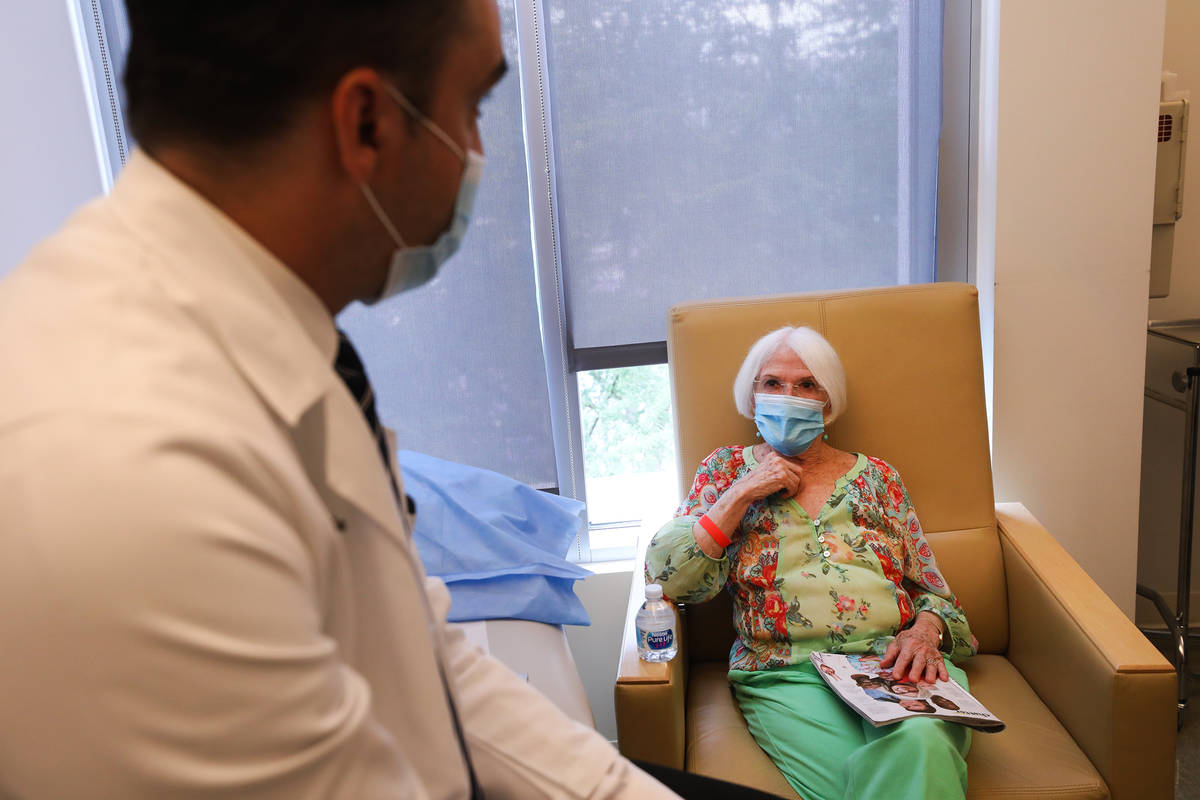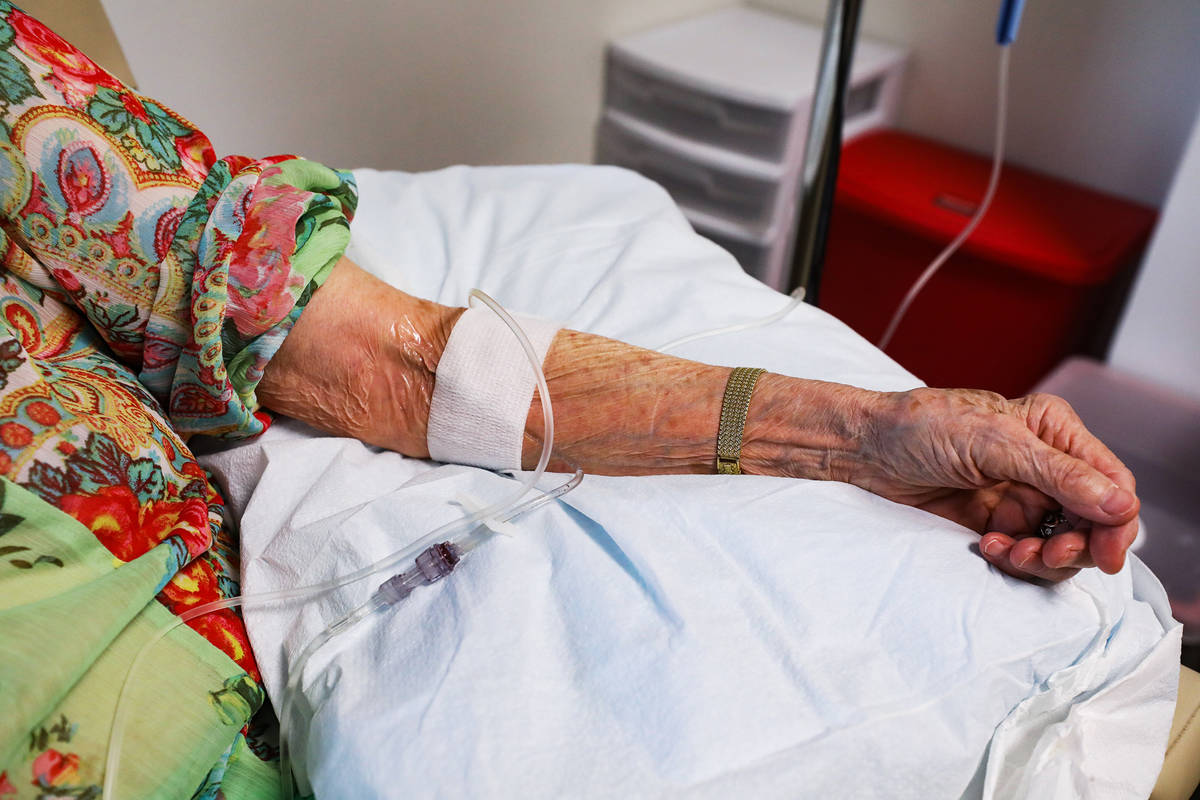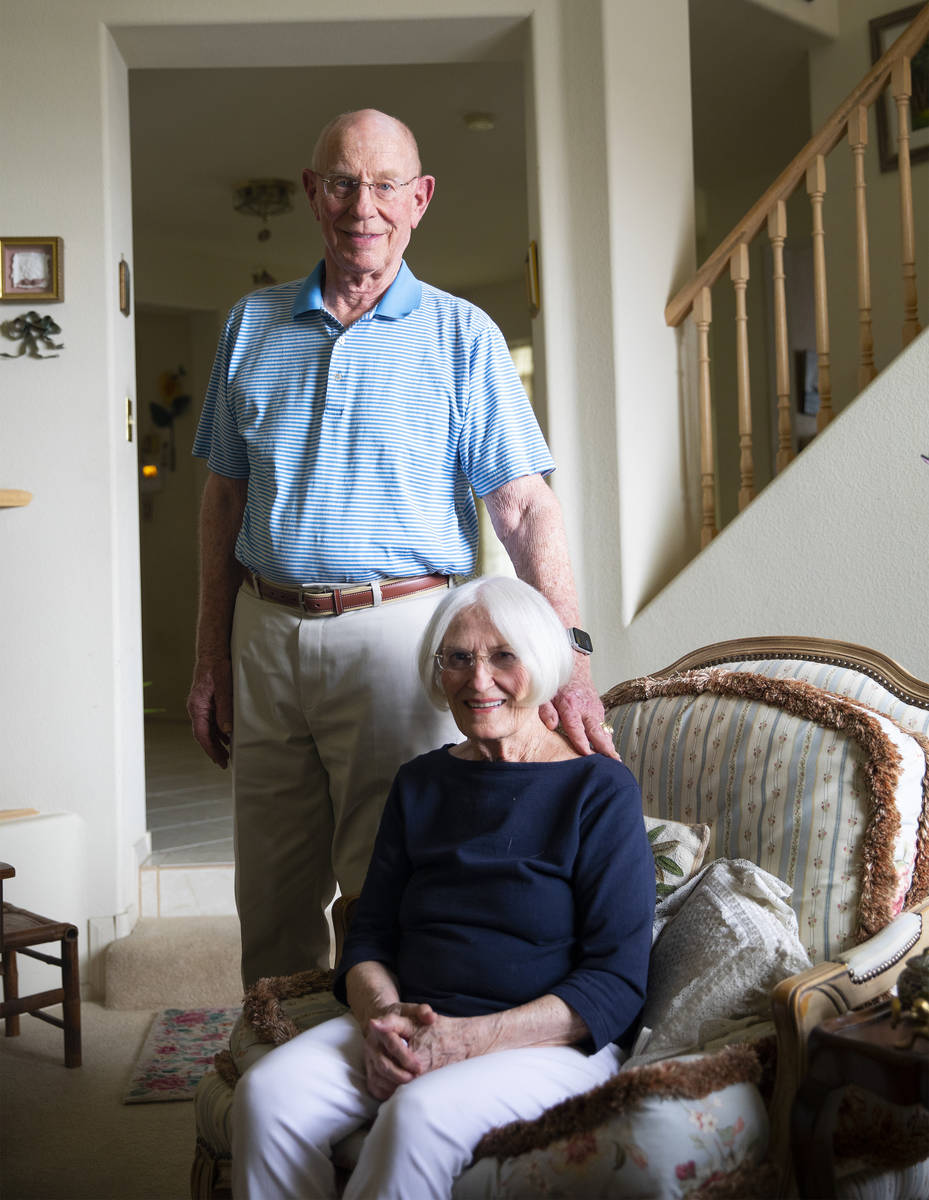New drug gives couple hope in Alzheimer’s fight, but not without controversy
Gary Robinson completes the thoughts of wife Judy, his sweetheart since their high school days in Los Angeles, when she gets stuck.
When a reporter asks how many years they’ve been married, Judy, who has sparkling eyes and a bright smile, turns to her husband. “Fifty-two?”
“Fifty-five. See how I help?” he says with a chuckle.
Gary frequently fills in gaps in memory for Judy, who has early-stage Alzheimer’s disease. They often make dinner together now, with Gary helping Judy follow a recipe she used to know by heart. They’ll go over a checklist of items Judy needs to bring to the gym. Since she can no longer drive, he takes her shopping.
Earlier in their marriage, the pair raised two children, a son and a daughter, and moved around the country for Gary’s job as a Bechtel project manager. Judy worked as a dental hygienist, a job she loved. Now retired in Las Vegas, with daily life centered on managing daily activities and household chores, they are more of a team than ever.
“She’s a good trooper,” says Gary, who is 77. “So are you,” responds Judy, 78.
She compliments her husband for being accommodating, but says, “I miss the independence of being able to just take off and go shopping by myself. But if that’s the worst thing I have to worry about, then that’s not bad.”
Gary sees a silver lining in her disease. “I feel fortunate that I can help her,” he says. “In a lot of ways, that’s a gift. We still enjoy each other.”
Judy hopes her memory doesn’t worsen: “I want to continue to … always be there for each other.”
Drug aims to slow decline
This is the promise that some doctors, Alzheimer’s advocacy groups, patients and their families see in Biogen’s newly approved Alzheimer’s drug Aduhelm: that it will slow loss in memory and decline in mental function, giving patients more meaningful time with loved ones.
Aduhelm, also known as aducanumab, is the first Alzheimer’s drug approved by the Food and Drug Administration in nearly two decades. It also is the first drug ever approved that is intended to do more than temporarily ease certain symptoms of the disease.
The monoclonal antibody, given as a monthly intravenous infusion, has been shown in clinical trials to significantly reduce a sticky plaque called beta-amyloid in the brain that is a characteristic of Alzheimer’s disease.
Far less clear, and hotly debated, is whether beta-amyloid is a central cause of Alzheimer’s disease, or just a symptom, and if clearing it from the brain will do much, if anything, to help patients. Since the drug’s approval in June, the controversy has only intensified.
Because the drug does not reverse the course of Alzheimer’s, it can potentially provide the greatest benefit to patients in the early stages of the disease, the population on whom it was tested. The FDA has limited its recommended use to patients with either mild cognitive impairment, such as Judy, or mild dementia, a more serious condition.
Condition goes unnoticed
Mild cognitive impairment often will go unnoticed by an acquaintance of a person with Alzheimer’s. And the patient won’t notice the impairment, which is a trait of the disease, said Dr. Aaron Ritter, a neuropsychiatrist and primary investigator of the Aduhelm EMERGE trial at the Cleveland Clinic Lou Ruvo Center for Brain Health in downtown Las Vegas.
It is usually a family member who will make an appointment at the Ruvo Center for a loved one when changes in behavior are significant enough that the person no longer seems reliable.
Ritter will hear from a family member, “I can’t rely on my mom to make sure that she’s going to send presents to the grandkids on the right date.” Or that she’s mixed up taxes that she’s been doing 20 years.
Judy’s condition came to light after a series of car accidents. In the first, in 2014, she ran a stop sign on a familiar route and had an accident, fracturing both her ankles. Her doctor figured she’d been daydreaming.
“Subsequent to the one in 2014, she got into two minor accidents,” Gary says. More concerning than the damage to the car — $12,000 worth, in one case — was “that she wasn’t aware of the accidents so much.”
Gary made an appointment for Judy at the Ruvo Center in 2016, where she was diagnosed with mild cognitive impairment. By April 2017, Judy had enrolled in the EMERGE trial, where some participants received a higher dose of Aduhelm. The study was double-blinded, meaning that neither Ritter nor the Robinsons know whether Judy initially received a placebo or the actual drug.
However, it is certain that Judy was on Aduhelm by October 2018, after the placebo-controlled portion of the trial had ended. She then remained on the drug until March 2019, when Biogen abruptly called a halt to its studies when results suggested the drug did not slow decline.
Months later, after further analysis of the results, Biogen again pivoted, saying that further review of the data indicated Aduhelm was effective when given in higher doses. In October 2019, the company announced it would seek accelerated approval from the federal government for the drug’s use.
After a lull caused by the pandemic, trials of the drug resumed at the Ruvo Center, and Judy again began receiving the drug in January of this year.
Controversy greets approval
On June 7, the FDA approved Aduhelm under an accelerated process that can be used for drugs to treat serious conditions when other options don’t exist. This process also allows approval before clear benefit has been shown, as was the case with Aduhelm.
In approving the drug, the FDA cited the urgent need for treatments for the more than 6 million Americans living with Alzheimer’s disease.
“Although the Aduhelm data are complicated with respect to its clinical benefits, FDA has determined that there is substantial evidence that Aduhelm reduces amyloid beta plaques in the brain and that the reduction in these plaques is reasonably likely to predict important benefits to patients,” said Dr. Patrizia Cavazzoni, director of the FDA Center for Drug Evaluation and Research.
The FDA is requiring ongoing trials of the drug and can reverse its approval if further evidence shows the drug doesn’t work.
However, critics of the decision note that the FDA went against the advice of its own advisory panel in approving the drug, which they say is unproven and may offer false hope to patients and their loved ones. The drug also is not without risk, with side effects that may include small brain bleeds.
Adding fuel to the debate is uncertainty over how patients, insurance companies or Medicare will pay for the drug, priced by Biogen at $56,000 a year. (The drug is provided free to patients who are in clinical trials.) It’s unclear how long a patient would need to take the drug.
As an indication of how divided the medical profession is over Aduhelm, Cleveland Clinic — the Ruvo Center’s parent organization — has determined that while its individual physicians may prescribe the drug, infusions apart from clinical trials will have to be done at outside facilities.
“A multidisciplinary panel of Cleveland Clinic experts have reviewed all available scientific evidence on this medication,” it said in a statement. “Based on the current data regarding its safety and efficacy, we have decided not to carry aducanumab (Aduhelm) at this time. However, we support continued research in this area, and when additional data become available, we will re-evaluate this medication for use in our patients.”
Gary, who has followed the controversy closely, is unmoved by it.
“Judy’s had, I believe, first-hand experience of the success of the drug,” he says.
His wife’s memory didn’t seem to him to get worse during her time in the trial before it was paused, an observation that Ritter said is supported by her scores on cognitive tests.
‘We can be aggressive and pro-active’
The neurologist said he has no access to the scans of Judy’s brain or tests that were performed as part of the trials, a condition designed to prevent bias in the studies. However, a commonly used cognitive test that he administered to Judy as her doctor before she entered a trial, and again after it was suspended, showed no decline in her scores.
The test, called the Montreal Cognitive Assessment, or MOCA, asks a patient to draw the face of a clock, for example, identify animals in a drawing, solve simple puzzles and remember several words for a period of time.
Gary observed a “slight slide” in his wife’s memory during the pause in trials when Judy was not on the drug. In a phone conversation with a cousin, for instance, Judy asked about an uncle who had died several years earlier.
Ritter said that Judy’s condition has remained quite stable since her diagnosis. Before the pause in the trial, the drug might already have cleared substantial amounts of plaque from her brain, he conjectured, which would be consistent with overall results from the studies.
“She’s had a much slower decline than we would have expected. I can say that pretty confidently,” he said.
Ritter views the drug’s approval as a significant step forward in treatment of the disease.
“This is the first time, in a person like Judy, we can actually be aggressive and proactive with the medical approach to her disease” and “attack this as early as possible,” he said.
One in 10 Alzheimer’s patients with mild cognitive impairment will advance into dementia in a given year, Ritter said. Data has indicated that Aduhelm may slow the decline in cognition and function by 23 percent, and the decline in function alone by 45 percent.
The descent from mild impairment to mild dementia can take three to five years, or even a decade in some patients, Ritter said. “If we can turn the mild cognitive impairment phase from five years to 10 years, that has a significant impact” on patients, families and costs to society, he noted.
High stakes
Judy and Gary hope that the drug will mean more good days ahead for them.
“I’m a happy camper,” Judy says. “I’ve got him” — Gary — “I’ve got my kids. I’ve got my dogs,” a golden retriever and a chihuahua-toy poodle mix. She also delights in the hummingbirds that build nests on the patio of their Peccole Ranch home in the western Las Vegas Valley.
“I function normally, as far as I’m concerned,” Judy says. “My mental capacity is what I consider normal. My daily routine seems to be fairly normal. I do all my regular chores and jobs, computer and reading. I don’t seem to have any problem with doing anything.”
She does worry about losing her ability to communicate, which she knows can happen in later stages of Alzheimer’s, and about falling into depression as the disease progresses.
“Depression does run in my family,” Judy says. “My father had a problem with it, and I’ve had depression in the past, and I’m very, very good night now, I think.
“I tend to be, I think. a very upbeat person, and I want to continue to be that way. But if I started to feel … my mood getting very low … that would be a hard thing for me to accept.”
As for Gary, “I worry about being able to support Judy. I have a fear that someday, she may not know me … or her children,” he says, his voice breaking.
They hope for the best.
“Maybe I’m playing ostrich, but I’m hoping I get to a certain point where I will always have my faculties and my ability to continue my life pretty much as it is right now,” Judy says.
“We’ll see as it goes. Take one day at a time.”
Contact Mary Hynes at mhynes@reviewjournal.com or 702-383-0336. Follow @MaryHynes1 on Twitter.
Why the fuss over Aduhelm (aducanumab)?
What is it? Aduhelm is an antibody manufactured by Biogen of Cambridge, Massachusetts, that received accelerated approval in June by the U.S. Food and Drug Administration as a treatment for Alzheimer's disease.
Why is it significant? It is "the first new treatment approved for Alzheimer's since 2003 and is the first therapy that targets the fundamental pathophysiology of the disease," according to the FDA.
How does it work? While the specific causes of Alzheimer's are not fully known, the disease is characterized by changes in the brain that result in loss of neurons and their connections. These changes affect a person's ability to remember and think. Aduhelm acts to undo some of these changes by reducing levels of beta-amyloid proteins that clump together and form plaques in the brains of Alzheimer's patients.
Sources: FDA, National Institutes of Health.

































